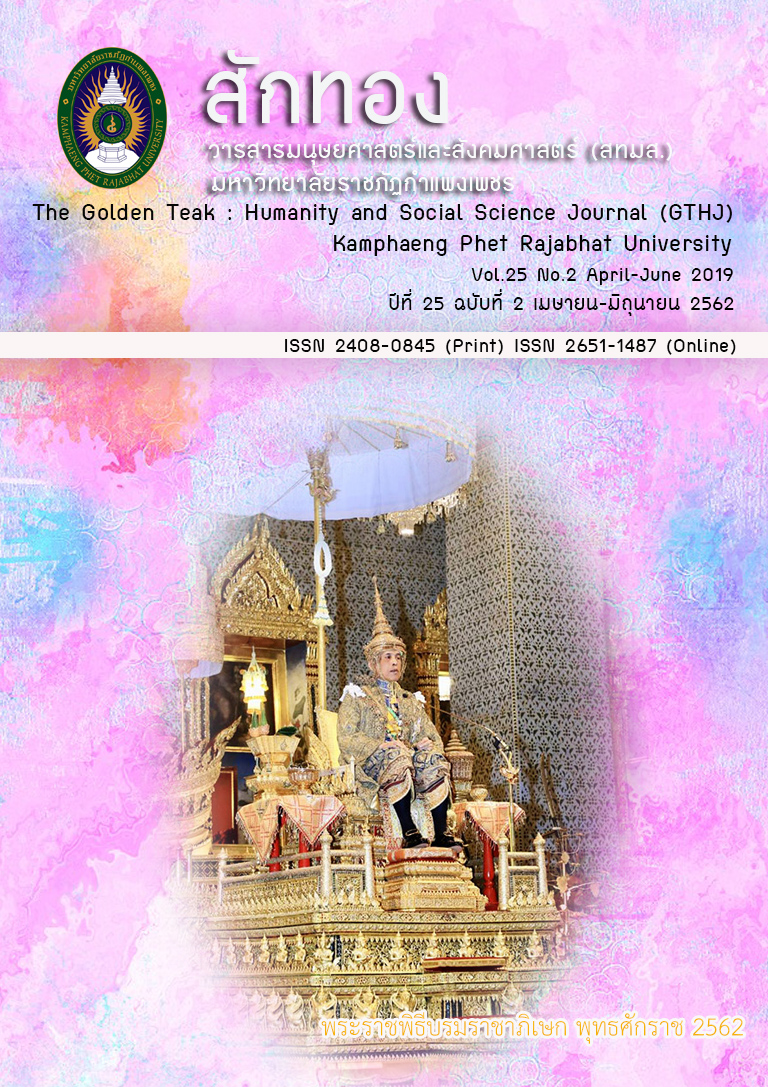A Business Management Model for One Tambon One Product (OTOP) Food Product in the Northern Region
Main Article Content
Abstract
In this dissertation, the researcher studies (1) the management conditions and management capability factors affecting the success of the One Tambon One Product (OTOP) business; constructs (2) a business management model for the OTOP business; and evaluates and presents (3) a business management model for the OTOP business. The study was divided into three steps. In Step One, the researcher studied management conditions and management capability factors affecting the success of the OTOP business. A method was adopted in which in-depth interviews were carried out with six chief executives of successful businesses. The data collected were then verified by means of a questionnaire used as a research instrument for collecting germane additional data from 541 executives, business operators, consumers, and middlemen in the business. In Step Two, the researcher constructed a business management model for the OTOP business. In this case, focus group discussions were held in the course of which two groups of experts of nine members each were discussants. In Step Three, the model constructed by the researcher was evaluated by eleven experts in the aspects of appropriateness, feasibility, correctness, and usefulness. Using techniques of descriptive statistics, the researcher analyzed the data collected in terms of mean (M), standard deviation (SD), and percentage (%). Findings showed that the management conditions and management capability factors affecting success in the business management of OTOPs all fell in the same direction as based on the opinions of executives and business operators. Overall actual standards were satisfied. The same was true in regard to the satisfaction of consumers and middlemen in the business. Satisfaction was overall evinced at a high level. Insofar as concerns the overall evaluation of the model, the experts found that it was appropriate, feasible, correct, and useful at a high level. The model constructed by the researcher and evaluated by the experts consisted of the following input factor components: (1) leadership; (2) personnel capabilities; (3) innovation and technology; (4) community and network building; and support from the public and private sectors. The components of the process of transference consisted of: (1) strategy planning; (2) production management; (3) marketing management; (4) finance and accounting management. The components of output consisted of: (1) consumer satisfaction; (2) sales; (3) net profits; (4) quantity of customers; and (5) quantity of middlemen.
Article Details
บทความที่ได้รับการตีพิมพ์เป็นลิขสิทธิ์ของวารสาร สักทอง : วารสารมนุษยศาสตร์และสังคมศาสตร์ สถาบันวิจัยและพัฒนา มหาวิทยาลับราชภัฏกำแพงเพชร
ข้อคิดเห็นใดๆ ที่ปรากฎในวารสารเป็นวรรณกรรมของผู้เขียนโดยเฉพาะ ซึ่งมหาวิทยาลัยราชภัฏกำแพงเพชรและบรรณาธิการไม่จำเป็นต้องเห็นด้วย
References
Ubon Ratchathani : Rajabhat Institute Ubon Ratchathani.
Bell, M. & Pavitt, C. (1997). Technological accumulation and industrial growth : Contrast
between developed and developing countries. Industrial and Corporate
Change, 2(2), 157-210.
Boonpituk, S. (2011). Model of Development Early Childhood Teachers Classroom
research Capability. Ph.D. Thesis. Naresuan University.
Chantawongsri, W. (2004). Factots Affecting the Success of Community
Enterprise Group Kantharawichai District Mahasarakham Province. Independent
Study Report Master of Economics. College Khon Kaen University.
Chiarakul, T. (2014). The Problems and the Adaptation of OTOP to AEC. Executive Journal
Huachiew Chalermprakiet University, 34(1), 181-184.
Dangayach, G.S. & Deshmukh, S.G. (2001). Manufacturing strategy, International. Journal of
Operations and Production Management, 21(7), 884-932.
Eisner, E.W. (1998). Educational Connoisseurship. The Enlightened Eye. USA : Prentice Hall.
Frese M. (2000). Success and failure of microbusiness owners in Afraca : A Psychological
Approach. The United States of America : Greenwood Publishing Group, Inc.
Hogeforster, M. (2014). Future challenges for innovations in SMEs in the Baltic Sea Region.
Procedia-Social and Behavioral Sciences, 110, 241-250.
Limskul, K. (2001). The Development of Local Public Participation. “One Tambon
One Product” (One Tambon One Product). [Online]. Available :
http://www.Thaitambon.com/OTOP/project.pdf [2553, December 25].
Office of the Nationan Economic and Social Development Council. (2017). National Economic
and Social Development Plan. No. 12.[Online]. Available : http://www.nesdb.go.th/
service.nso.go.th/nso/nsopublish/servopin/files/OTOPRep54.pdf [2560, October 20].
Pibulsarawut, P. (2006). The Concept of Sufficiency Ecomomy. [Online]. Available :
http://www.sufficiencyeconomy.org [2555, January 15].
Schermerhorn, J.R. (2011). Introduction to Management. New York : John Wiley & Son.
Suh, Y. & Kim, M. (2014). International leading SMEs vs. Internationalized SMEs: Evidence of
success factors from South Korea. International Business Review, 23, 115-129.
Suntawan, T. (2007). The Administrative Model of Ethical Development for
Rajabhat University on Lower Northern Region. Ph.D. Thesis. Naresuan University.
Surasil, S. (2005). Administrative guidelines for One Tambon One Product
According to the view of the producer group was chosen OTOP PRODUCT
CHAMPION. Master of Science on Industrial Business. Graduate School King Mongkut’s
University of Technology North Bangkok.
Wailerdsak, N. (2013). Thai Kitchen to the World Kitchen in ASEAN : Processed food
export business. [Online]. Available : http://www.bangkokbiznews. com/home/detail/
politics/opinion/asean/20130725/518913 [2557, August 14].
Watjanatapin, S. & Rabob, C. (2012). Food Industry quality Development Project and Processed
agricultural products OTOP Nakhom Nayok. Academic Journal, 15(30), 89-105.
Wonganupornkul, P. (2009). Marketing development guidelines of community
enterprise : Case study of community enterprise, Wat Chan Pattana Tambon
Wat Chan Mueang Phitsanulok. Master of Arts Thesis. Pibulsongkram Rajabhat
University.
Wongnaya, N. (2012). The Development Knowledge Management Model of Media
Network for Children and Youth in the Northern Region. Ph.D. Thesis. Silpakorn
University.
Yawirat, N. (2004). Leadership and strategic leaders. Bangkok : Central Express.


